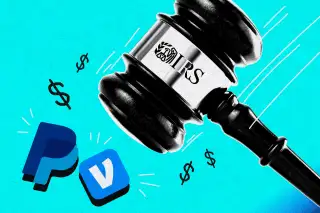Why You May Get a Tax Form About Your Venmo and PayPal Transactions Come Spring

If you ran a profitable Etsy business or sold expensive Eras Tour tickets this year, you may get an unexpected tax form come spring. Sellers receiving payments over certain amounts via some platforms and online marketplaces will soon be issued Form 1099-Ks under revised IRS rules.
When a new law is fully implemented in 2026, companies including Venmo, PayPal, eBay and Etsy will be required to distribute the form to any business or seller whose gross transactions exceed a drastically reduced threshold of $600. But amid blowback, the IRS keeps tweaking how it phases in the controversial policy.
The latest instance came just before Thanksgiving, when the IRS announced it intends to provide "relief" for Americans who professionally use payment apps and online marketplaces through 2025. In a Nov. 26 news release, the agency confirmed that payment firms will be required to report gross transactions exceeding $5,000 in 2024.
The threshold in 2025 will be $2,500.
In 2021, Congress passed a law imposing these 1099-K reporting requirements that apply to digital payments for goods and services, causing panic in numerous selling communities. Implementation has been gradual, but even as the IRS slowly rolls out the new rules, the changes are facing opposition from critics who say they put a burden on businesses and individuals that transact on several commonly used platforms.
While the IRS says its delays are providing relief, the ultimate plan to apply reporting requirements if sales exceed $600 is seen as an overreach by many Republicans in Congress. The IRS's recent announcement has already caused several GOP legislators to speak out against the 1099-K change, leaving its future in jeopardy ahead of President-elect Donald Trump's second term.
Why 1099-K rules keep changing
The American Rescue Act, passed in 2021, created the new requirements for Form 1099-K reporting with the goal of improving tax compliance. Previously, the policy was for Form 1099-Ks to be distributed when a seller had at least 200 transactions totaling over $20,000.
Under the American Rescue Act, the forms will instead be issued for individuals and business for "selling goods or providing a service over $600." The rules will apply regardless of the number of transactions, according to the IRS.
The IRS provides guidance on which payment networks are affected. The reporting requirements apply to "central organizations" that mediate transactions between buyers and sellers; for example, "an online auction payment facilitator like an online marketplace." That reportedly includes ticket exchange sites like StubHub, shopping marketplaces like eBay, peer-to-peer payment platforms like PayPal and gig-work companies like Uber.
The lower threshold is still being phased in, and it has faced opposition along the way from concerned selling platforms and payment companies. In addition to issuing the form to taxpayers, Form 1099-K documentation is also filed with the government, detailing gross transactions to the IRS by Jan. 31 of the subsequent year.
In late 2022 and late 2023, as companies like Venmo and Ticketmaster were bracing to send out 1099-Ks to millions of sellers, the IRS announced delays to the implementation of the reporting requirements. But barring any additional changes, the final threshold of $600 will go into effect in 2026. In 2025, it will be $2,500.
If you receive a Form 1099-K, it likely means you'll need to report something on Line 8 of your tax return.
Lawmakers: Lower thresholds are a burden for businesses
Ever since the IRS announced the $5,000 threshold for 2024 on Nov. 26, several key Republican lawmakers in the House Ways and Means committee have raised the alarm, including Rep. Jason Smith, R-Mo., the chairman. The law creates requirements "burying gig workers under a mountain of paperwork," he said in a statement.
A bill from Rep. Carol Miller, R-WV, would repeal the law creating the $600 threshold. In a statement, she said businesses have been "paralyzed with confusion" due to the numerous delays.
"I’m confident that with Republicans in charge, we will raise the reporting threshold so Americans paying rent through Venmo or selling used exercise equipment on eBay aren’t being taxed as a small business,” Miller said.
It's a gray area that's difficult to contend with. While many personal transactions like reimbursements from friends for shared dinners are not taxed, a seller who makes profit, even if that's from concert tickets or the sale of clothing items in their closet, could have to pay income tax because the IRS has been alerted to the transaction.
The key word is "could." For sellers, a 1099-K doesn't necessarily mean you have to pay taxes on a sale. For example, if you sell $5,000 of a good on eBay but make no profit, you would receive a 1099-K form from eBay, but you wouldn't owe the IRS.
In fact, the IRS argues that taxes aren't changing at all: You were always supposed to include all income on your tax return, anyway. But profitable businesses receiving payments digitally could end up paying more in taxes with the additional requirements as the tracking increases.
Although the threshold is set for 2024, the future of the 1099-K debate is unclear. Congress could theoretically pass legislation changing the law, or new IRS leadership could alter the implementation timeline. With Republican majorities in the next Congress and Trump taking office, lawmakers are expected to make a big push to renew Trump's 2017 tax cuts and could attempt to undo other Biden-era tax law changes in the process.
More from Money:
5 Best Tax Relief Companies of 2024
Why States With No Income Tax Aren't as Affordable as They Seem
10 Ways Millionaires (Legally) Keep Their Taxes Down in Retirement